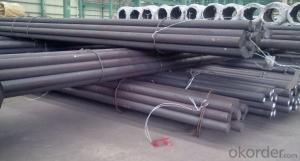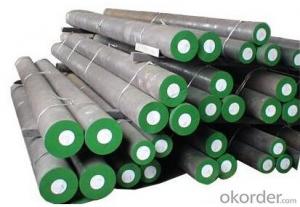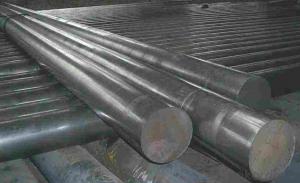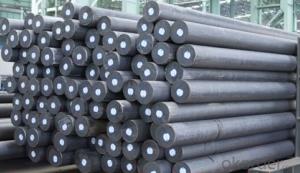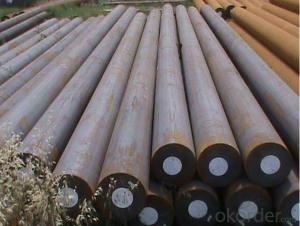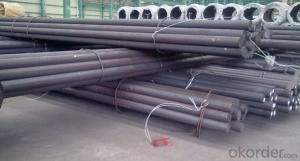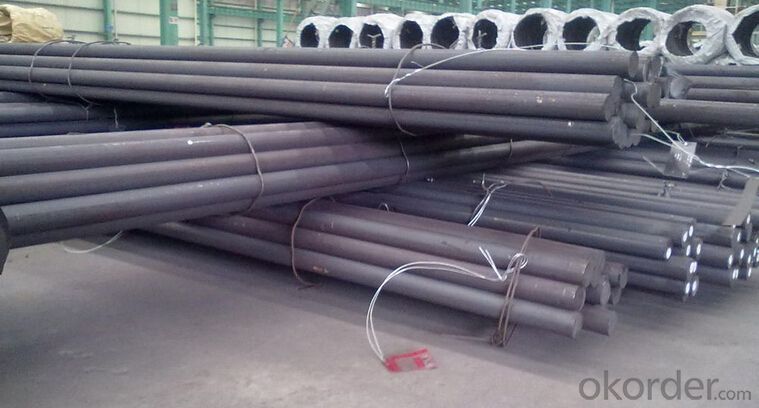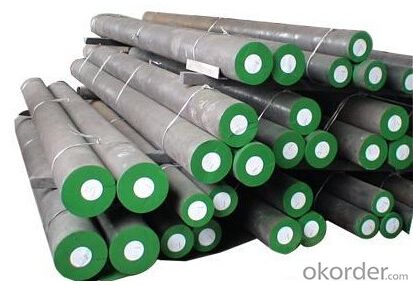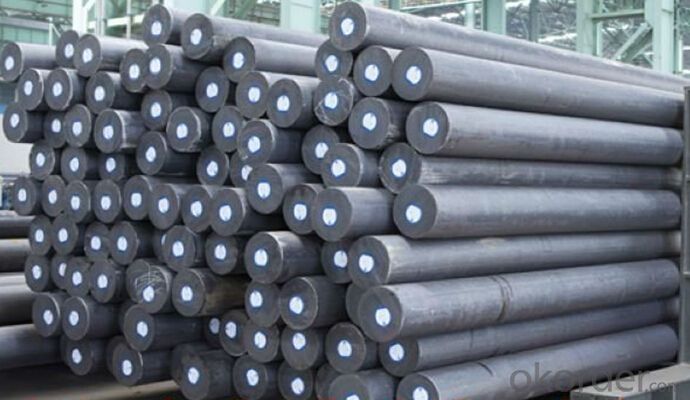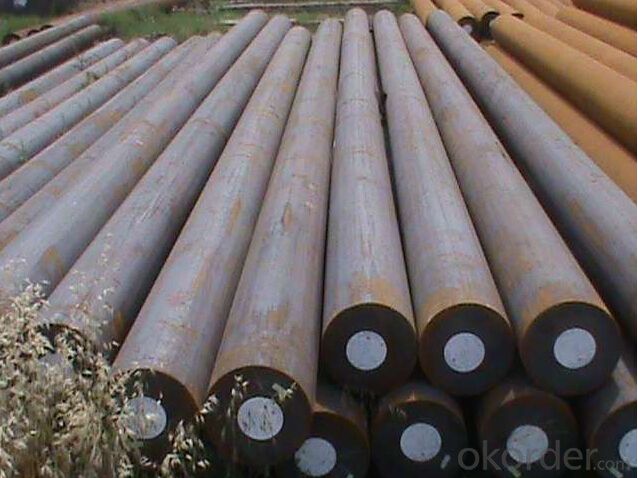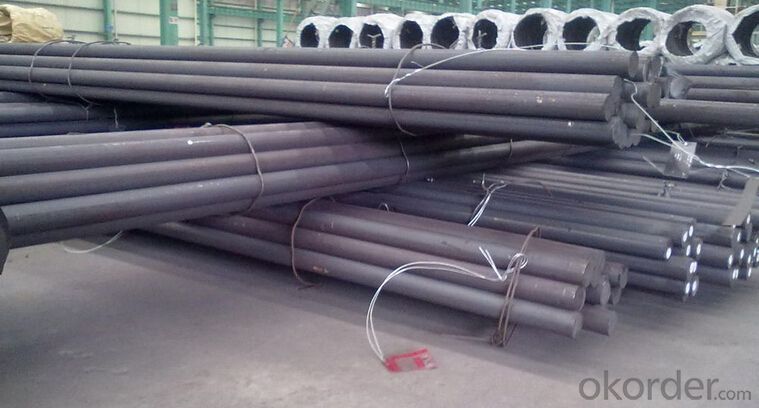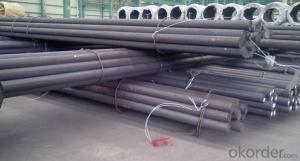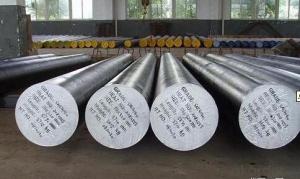Grade SAE1008 CNBM Alloy Steel Round Bar
- Loading Port:
- Shanghai
- Payment Terms:
- TT OR LC
- Min Order Qty:
- 3 m.t
- Supply Capability:
- 10000 m.t/month
OKorder Service Pledge
OKorder Financial Service
You Might Also Like
Specification
Specification of Round Bar
Diameter: 4mm - 800mm
Length: Max 12m
Heat Treatment: Normalizing, Annealing, Tempering, Quenching
Chemical Composition
C | Si | Mn | P | S | Cr | Ni | Cu |
0.47~0.55 | 0.17~0.37 | 0.50~0.80 | ≤0.035 | ≤0.035 | ≤0.15 | ≤0.25 | ≤0.25 |
Our Featured Products
Description | Alloy Steel / Carbon Steel / Spring Steel, Bearing Steel | |
Alloy Steel | ASTM | 1320, 1330, 1335, 1340, 1345, TS14B35, 50B46H, |
50B44, 5115, 5120, 5130, 5132, 5140, 5145, A-387Cr.B | ||
4119, 4125, 4130, 4140, 4135, 6120, 6140, 6150, 5152 | ||
3140H, 3316, 3325, 3330, 80B20, 4340, 50B40 | ||
DIN | 20Mn5, 30Mn5, 36Mn5, 46Mn7, 20MnV6, 37MnSi5 | |
46MnSi4, 15Cr3, 20Cr4, 28Cr4, 34Cr4, 41Cr4, 13CrMo44 | ||
16CrMo44, 20CrMo44, 25CrMo4, 42CrMo4, 34CrMo4 | ||
13CrMoV42, 22CrV4, 42CrV6, 50CrV4, 40NiCr6, 20NiCr14 | ||
28NiCr10, 41CrAlMo07, 40NiCrMo22, 34CrNiMo6 | ||
JIS | SMn420, SMn433H, SMn438H, SMn443, SCr415H, SCr420H | |
SCr430(H), SCr440, SCr445, STC42, STT42, STB42, SCM420 | ||
SCM440, SCM435, SUP10, SUP9, SNC236, SNC631, SAC645 | ||
Carbon Steel | ASTM | 1005,1006,1008,1010,1015,1020,1025,1030,1035, 1040 |
1045, 1050, 1055, 1060, 1065, 1070, 1080, 1084, | ||
DIN | C10, C15, C22, C35, C45, C60, Ck25, Ck35, Ck40,Ck45, Ck50 | |
Ck53, 14Mn4, 30Mn4, 40Mn4 | ||
JIS | S09CK, S9CK, S10C, S15C - S53C | |
Spring Steel | ASTM | 1060, C1085, 1084, 1566, 9255, 9260, 9260H, 6150 |
DIN | C60, 55Si7, 65Si7, 50CrV4, 60SiCr7 | |
JIS | S58C, SUP3, SUP6, SUP7, SUP10 | |
Bearing Steel | ASTM | sae 52100 |
DIN | 100Cr6 | |
JIS | suj 2 | |
Standard | GB/T799,ASTM A29,A108,A321,A575,BS970,DIN1652,JIS G4051 | |
Section shape | Round Bar, Square Bar, Wire Rod, Flat Bar, Angle Bar, Tube /Pipe | |
Surface | Black, Polished, Coated, Galvanized | |
Specifications | Round bar | Diameter: 4mm - 800mm |
Angle bar | Size: 3mm*20mm*20mm - 12mm*800mm*800mm | |
Square bar | Size: 4mm*4mm - 100mm*100mm | |
Flat bar | Thickness: 2mm- 100mm | |
Width:10mm - 500mm | ||
Hexagonal | Size: 4mm - 800mm | |
Length | 2m, 4m, 5.8m, 6m, 11.8m, 12m or as required. | |
Trade terms | Payment terms | 30% T/T Deposit, 70%T/T before Delivery |
L/C at Sight | ||
Price terms | FOB,CIF,CFR,EXW | |
Package | Bundled, wooden box for export standard package. | |
Export to | Ireland,Singapore,Indonesia,Ukraine,Saudi Arabia,Spain, | |
USA,Brazil,Thailand,Korea,Italy,India,Egypt,Oman,Malaysia, | ||
Kuwait,Canada, Viet Nam, Peru,Mexico,Dubai, Russia,etc | ||
Delivery Time | About 30-40 days | |
According to QTY | ||
Usage and Applications of Round Bar
1. Chinese standard steel bar is often used where large amounts of steel need to be formed, for example as structural steel.
2. And we can use this kind of product on the performance of the mechanical parts if the demand is not very high.
3. Steel round bar is used in construction and a large number of architectural and engineering structures.
Packaging & Delivery of Round Bar
Packaging Detail: All goods are packed in bundle with steel strips and shipped by break bulk vessel or container (depend on target market and different ports)
Delivery Detail: 15~45 days
Trade terms: FOB, CFR, CIF
Weight: Theprice invoicing on theoretical weight basis or actual weight basis depends on customer’s request.
Shipment: The shipment of bulk break or container is depends on customer’s request and the situation of the port of destination.
Documents given: Full set of original clean on board bill of lading; Original signed commercial invoice; Original packing list; Policy of insurance; Certificate of origin and what the target market needs.
FAQ:
Q1: Why buy Materials & Equipment from OKorder.com?
A1: All products offered byOKorder.com are carefully selected from China's most reliable manufacturing enterprises. Through its ISO certifications, OKorder.com adheres to the highest standards and a commitment to supply chain safety and customer satisfaction.
Q2: How do we guarantee the quality of our products?
A2: We have established an advanced quality management system which conducts strict quality tests at every step, from raw materials to the final product. At the same time, we provide extensive follow-up service assurances as required.
Q3: How soon can we receive the product after purchase?
A3: Within three days of placing an order, we will begin production. The specific shipping date is dependent upon international and government factors, but is typically 7 to 10 workdays.
Q4: What makes stainless steel stainless?
A4: Stainless steel must contain at least 10.5 % chromium. It is this element that reacts with the oxygen in the air to form a complex chrome-oxide surface layer that is invisible but strong enough to prevent further oxygen from "staining" (rusting) the surface. Higher levels of chromium and the addition of other alloying elements such as nickel and molybdenum enhance this surface layer and improve the corrosion resistance of the stainless material.
Q5: Can stainless steel rust?
A5: Stainless does not "rust" as you think of regular steel rusting with a red oxide on the surface that flakes off. If you see red rust it is probably due to some iron particles that have contaminated the surface of the stainless steel and it is these iron particles that are rusting. Look at the source of the rusting and see if you can remove it from the surface.
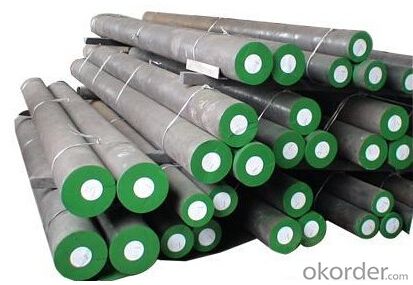
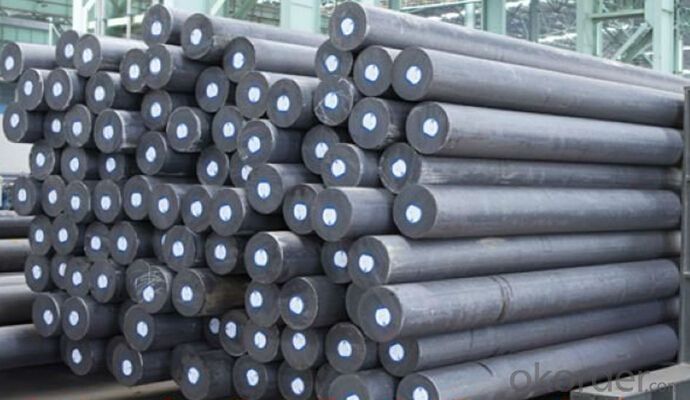
- Q: How does special steel contribute to the manufacturing of oil and gas equipment?
- Special steel plays a vital role in the manufacturing of oil and gas equipment by offering exceptional strength, corrosion resistance, and high-temperature stability. This type of steel is specifically designed to withstand the harsh and challenging conditions encountered in the oil and gas industry, such as extreme temperatures, pressure, and corrosive environments. It is used to construct various components of equipment like pipes, valves, fittings, drilling tools, and offshore platforms. Special steel's superior properties ensure the reliability, durability, and safety of oil and gas equipment, enabling efficient operations in this critical sector.
- Q: How does special steel perform in high-stress environments?
- Special steel is designed specifically for high-stress environments, excelling in various forms of stress, including mechanical, thermal, and chemical stress. What sets it apart is its distinct composition and manufacturing process, resulting in exceptional resistance to stress. One of the standout features of special steel is its remarkable tensile strength. It can withstand immense pressure without deforming or failing. This strength is achieved by incorporating alloying elements like chromium, nickel, and molybdenum, which enhance its structural integrity and toughness. These elements also enhance the steel's resistance to corrosion and oxidation, ensuring its durability and reliability in harsh conditions. Additionally, special steel exhibits superb fatigue resistance, enabling it to endure repetitive and cyclic loading without developing cracks or fractures. This quality is crucial in high-stress environments where components are constantly subjected to vibrations or cyclic loading, such as in aerospace, automotive, and industrial applications. Not only does special steel possess impressive mechanical properties, but it also boasts exceptional resistance to extreme temperatures. It retains its strength and integrity even at elevated temperatures, making it suitable for use in high-temperature environments like power plants, furnaces, and chemical processing industries. Furthermore, special steel excels in wear resistance, enabling it to withstand abrasive conditions encountered in mining, construction, or manufacturing processes. This reduces the need for frequent maintenance or replacement, resulting in cost savings and increased productivity. In conclusion, special steel's outstanding performance in high-stress environments can be attributed to its unique combination of strength, durability, corrosion resistance, fatigue resistance, temperature resistance, and wear resistance. Its ability to withstand extreme conditions makes it the ideal choice for critical applications where reliability and safety are of utmost importance.
- Q: What are the different types of high-speed steel?
- There are several different types of high-speed steel, including M1, M2, M42, and T1. These variations have different compositions and properties, such as varying levels of tungsten, molybdenum, and vanadium, which affect their hardness, toughness, and heat resistance.
- Q: How is nitriding steel used in the production of tools and dies?
- Nitriding steel is used in the production of tools and dies through a process called nitriding. This involves introducing nitrogen into the surface of the steel, which forms a hard layer of nitrides, increasing the overall hardness, wear resistance, and corrosion resistance of the material. This enhanced surface hardness makes the tools and dies more durable and long-lasting, allowing them to withstand the high stresses and temperatures experienced during cutting, forming, and shaping processes. Additionally, nitriding steel can also improve the fatigue strength and reduce the friction of the tools and dies, enhancing their performance and efficiency in various industrial applications.
- Q: How does special steel contribute to the longevity of products?
- Special steel contributes to the longevity of products in several ways. Firstly, special steel is known for its exceptional strength and durability. It is specifically engineered to withstand extreme conditions, such as high temperatures, pressure, and corrosive environments. This makes it ideal for use in various industries, including aerospace, automotive, and construction. The high strength of special steel allows products to withstand heavy loads and resist deformation, ensuring they remain intact and functional for an extended period. For instance, in the construction industry, special steel is commonly used in structural components like beams and columns, which provide the necessary support and stability to buildings over many years. Moreover, special steel has excellent resistance to wear and abrasion. It can withstand constant friction, impact, and contact with other materials without significant deterioration. This characteristic is crucial in industries where products are subject to continuous use, such as machinery, tools, and equipment. The use of special steel in these applications ensures that the products remain in good working condition for a longer time, reducing the need for frequent repairs or replacements. Furthermore, special steel has exceptional corrosion resistance, making it highly resistant to rust and other forms of corrosion. This property is particularly beneficial in products exposed to harsh environments or chemicals, such as marine vessels, pipelines, and chemical processing equipment. By using special steel, manufacturers can significantly extend the lifespan of these products, minimizing the risk of failure or breakdown due to corrosion. In summary, special steel contributes to the longevity of products by providing superior strength, durability, wear resistance, and corrosion resistance. Its exceptional properties allow products to withstand harsh conditions, heavy loads, and continuous use, ensuring they remain functional and reliable for an extended period. By incorporating special steel into their designs, manufacturers can significantly enhance the lifespan of their products, leading to cost savings, improved reliability, and customer satisfaction.
- Q: What are the main factors affecting the heat resistance of special steel?
- The main factors affecting the heat resistance of special steel include its alloy composition, microstructure, and heat treatment. Alloy composition plays a crucial role in determining the heat resistance of special steel. The addition of specific elements such as chromium, nickel, molybdenum, and tungsten can enhance the steel's ability to withstand high temperatures. These alloying elements form stable oxide layers on the surface of the steel, which act as a barrier against oxidation and corrosion at elevated temperatures. The microstructure of special steel also influences its heat resistance. The steel's grain size, distribution of phases, and the presence of precipitates can affect its thermal stability. Fine-grained structures and a homogeneous distribution of phases help improve the steel's resistance to creep, which is the deformation that occurs under prolonged exposure to high temperatures. Additionally, the presence of precipitates, such as carbides or intermetallic compounds, can provide strengthening mechanisms that enhance the steel's resistance to thermal softening. Heat treatment processes, such as quenching and tempering, can significantly impact the heat resistance of special steel. Proper heat treatment can optimize the microstructure and enhance the steel's mechanical properties, including its resistance to thermal degradation. For instance, a well-controlled quenching process can promote the formation of a martensitic structure, which increases the steel's hardness and strength at high temperatures. Other factors that can affect the heat resistance of special steel include the presence of impurities, surface conditions, and environmental factors. Impurities, such as sulfur and phosphorus, can reduce the steel's resistance to high temperatures by promoting the formation of brittle phases or facilitating oxidation. Surface conditions, such as roughness or the presence of cracks, can lead to localized heating and accelerated degradation. Environmental factors, such as the presence of corrosive gases or high humidity, can also influence the steel's heat resistance by promoting oxidation or corrosion processes. In summary, the heat resistance of special steel is influenced by its alloy composition, microstructure, heat treatment, impurities, surface conditions, and environmental factors. Understanding and optimizing these factors are crucial for developing special steel with superior heat resistance for various industrial applications.
- Q: How does special steel contribute to the aerospace defense industry?
- Special steel plays a vital role in the aerospace defense industry as it offers the essential strength, durability, and resistance to extreme conditions needed for various applications in aircraft and defense systems. One of the primary contributions of special steel in this industry lies in its capacity to endure high temperatures and pressures. For instance, special steel alloys are utilized to manufacture turbine blades and other components in aircraft engines that are constantly exposed to exceedingly hot gases. These alloys possess excellent heat resistance properties, enabling them to maintain their strength and structural integrity even under such demanding circumstances. Furthermore, special steel exhibits exceptional resistance to corrosion and erosion, rendering it ideal for aerospace applications. Given that aircraft and defense systems often operate in harsh environments, including exposure to saltwater, moisture, and other corrosive elements, special steel alloys like stainless steel are employed to prevent rusting and corrosion. This ensures the longevity and dependability of critical components. Additionally, special steel is employed in the production of armor plates and ballistic protection systems for military vehicles and aircraft. Its high tensile strength and impact resistance make it an indispensable material for these applications, providing enhanced protection for military personnel and assets. Moreover, special steel finds application in the manufacturing of landing gears, wing components, and airframe structures. These components must withstand tremendous forces and stresses during takeoff, landing, and flight, making the strength and durability of special steel vital for the safety and performance of aerospace systems. In conclusion, special steel plays a crucial role in the aerospace defense industry by supplying the necessary strength, durability, and resistance to extreme conditions required for various applications. Its ability to endure high temperatures and pressures, resist corrosion and erosion, as well as its high tensile strength, make it an essential material in the manufacturing of aircraft engines, armor plates, ballistic protection systems, and other critical components.
- Q: How does special steel perform in terms of machinability?
- Special steel typically has good machinability due to its composition and specific manufacturing processes. It is often designed to have improved cutting and chip formation properties, allowing for easier and more efficient machining operations. This allows manufacturers to achieve high precision and productivity when working with special steel, making it a favorable choice for various applications.
- Q: What are the cutting tools used for machining special steel?
- The cutting tools commonly used for machining special steel include carbide inserts, high-speed steel (HSS) drills and end mills, ceramic inserts, and diamond-coated tools. These tools are designed to withstand the high temperatures and hardness of special steel, ensuring precise and efficient cutting.
- Q: Can special steel be used for making chemical processing equipment?
- Yes, special steel can be used for making chemical processing equipment. Special steel, such as stainless steel or corrosion-resistant alloys, are commonly used in the construction of chemical processing equipment due to their excellent resistance to corrosion, high temperature and pressure, and ability to withstand harsh chemical environments.
Send your message to us
Grade SAE1008 CNBM Alloy Steel Round Bar
- Loading Port:
- Shanghai
- Payment Terms:
- TT OR LC
- Min Order Qty:
- 3 m.t
- Supply Capability:
- 10000 m.t/month
OKorder Service Pledge
OKorder Financial Service
Similar products
Hot products
Hot Searches
Related keywords
